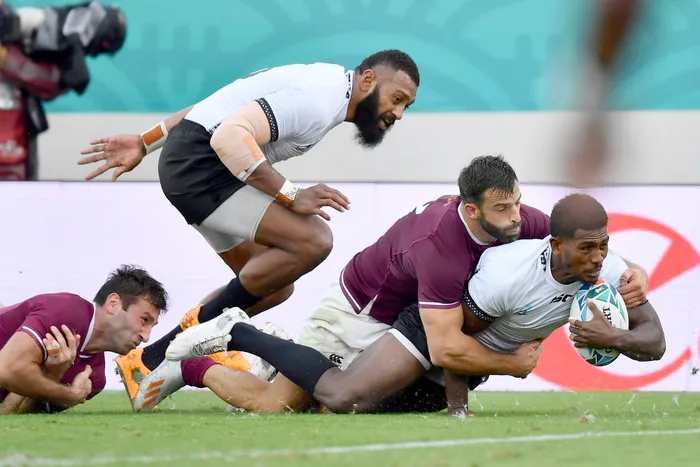Pacific players call for major rule changes after World Cup disappointments

Fiji’s Frank Lomani scores a try against Georgia. Photo: Ren Onuma/Kyodo News via AP Fiji’s Frank Lomani scores a try against Georgia. Photo: Ren Onuma/Kyodo News via AP
LONDON – The head of the body representing Pacific region rugby players will fly to the Rugby World Cup on Wednesday for crucial talks about improving the plight of those from countries such as Fiji, Tonga and Samoa who have failed to make an impact in Japan.
Tonga and former quarter-finalists Samoa have already missed out on a place in the last eight this time, and defeat to Wales on Wednesday would put Fiji out of the tournament by the time Pacific Rugby Players (PRP) union chief Aayden Clarke arrives for meetings in Tokyo with governing body World Rugby.
New Zealander Clarke is looking for significant changes to the regulations on the availability of players for national teams and on switching nationalities.
"At the core of many issues is the fact that the players do not get paid well for playing for their country," Clarke told the Global Sports Forum chatroom organised by data company Refinitiv on Tuesday.
"Twenty percent of the professional players across the globe are of Pacific decent. We play a huge role in the game.
"The Pacific island players will remain a feature of the game across the world. For the sake of rugby, we also need the countries they come from such as Tonga, Fiji and Samoa to be competitive. Often the model of distribution of World Rugby funds to the Pacific does not work as effectively as it could... Now is the time (for change)."
Clarke did not go into the details of his proposals before the World Rugby meetings. But former Ireland international and coach Bernard Jackman told the Forum that Pacific players who had played for Tier One countries should be allowed to switch back to their former nations at the end of their careers.
"I would like to see an amnesty of some sort where players that have played for tier one countries through residency can re-grade down to their home nation after they retire from that team or go abroad," Jackman said. "Having coached in France, I also know how difficult it can be for some Pacific Island players having to choose between club and country."
One of the biggest problems for the Pacific nations is a lack of regular international rugby at the top level.
World Rugby's recent plans for an annual tournament of the Tier One Six Nations and Rugby Championship countries teams plus two other countries gave hope to the Pacific islands.
But the idea was dropped in June because of a lack of support from the northern hemisphere.
Clarke said he still hoped to see Pacific Nations playing in the Championship in the southern hemisphere, though.
"The global calendar is not fair at all. The recent Nations Championship global competition was killed by a few northern unions. We need quality competition for the Pacific teams," he said.
"The best answer currently being discussed is creating a second tier Rugby Championship - New Zealand, Australia, South Africa and Argentina in the top tier and then Japan, Samoa, Tonga and Fiji. There are also discussions on how to include the United States."
Clarke said PRP was about to launch the first ever Pacific Agent accreditation system, so that players could be represented better in their negotiations to move to Tier One countries.
"It's very difficult to implement, given all agents live across the globe, but it is a start," Clarke said. "Our education to parents and young players is working well. It is not always about money, but making sure their welfare is being cared for and that good career decisions are made," he said.
"Parents sometimes push their children to the first offer. They have no idea if it is good or bad."